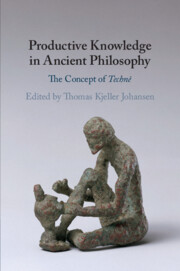Book contents
- Productive Knowledge in Ancient Philosophy
- Productive Knowledge in Ancient Philosophy
- Copyright page
- Contents
- Contributors
- Acknowledgements
- List of Abbreviations
- Introduction
- Chapter 1 Protagoras on Political Technê
- Chapter 2 Dynamic Modalities and Teleological Agency
- Chapter 3 Technê As a Model for Virtue in Plato
- Chapter 4 Crafting the Cosmos
- Chapter 5 Aristotle on Productive Understanding and Completeness
- Chapter 6 Technê and Empeiria
- Chapter 7 The Stoics on Technê and the Technai
- Chapter 8 The Epicureans on Technê and the Technai
- Chapter 9 The Sceptic’s Art
- Chapter 10 Plotinus on the Arts
- Chapter 11 Productive Knowledge in Proclus
- Bibliography
- General Index
- Index Locorum
Chapter 5 - Aristotle on Productive Understanding and Completeness
Published online by Cambridge University Press: 14 January 2021
- Productive Knowledge in Ancient Philosophy
- Productive Knowledge in Ancient Philosophy
- Copyright page
- Contents
- Contributors
- Acknowledgements
- List of Abbreviations
- Introduction
- Chapter 1 Protagoras on Political Technê
- Chapter 2 Dynamic Modalities and Teleological Agency
- Chapter 3 Technê As a Model for Virtue in Plato
- Chapter 4 Crafting the Cosmos
- Chapter 5 Aristotle on Productive Understanding and Completeness
- Chapter 6 Technê and Empeiria
- Chapter 7 The Stoics on Technê and the Technai
- Chapter 8 The Epicureans on Technê and the Technai
- Chapter 9 The Sceptic’s Art
- Chapter 10 Plotinus on the Arts
- Chapter 11 Productive Knowledge in Proclus
- Bibliography
- General Index
- Index Locorum
Summary
According to Aristotle, a technê is both a productive power and a kind of epistêmê. In so far as it is a kind of epistêmê, it deals with universals, involves grasping explanations and does not concern itself with the accidental. But a puzzle arises about how something can both be an epistêmê in this sense and at the same time be a power for producing things. Successful production requires the ability to make adjustments to take account of indefinitely variable circumstances. In this chapter, Coope argues that this essential flexibility of technê marks an important difference between it and theoretical epistêmê. Whereas a theoretical epistêmê is potentially complete (in the sense that it is possible in principle to possess all the explanations of the epistêmê), a technê is indefinitely improvable (however many explanations one grasps, there will always be further explanations to be worked out). Because of this, even an expert in a technê needs to have the capacity for working out new explanations. It is possible for Aristotle to think of technê in this way just because he (unlike, for instance, later Christian authors) does not think there is such a thing as a divine technê.
- Type
- Chapter
- Information
- Productive Knowledge in Ancient PhilosophyThe Concept of <I>Technê</I>, pp. 109 - 130Publisher: Cambridge University PressPrint publication year: 2021
- 2
- Cited by

